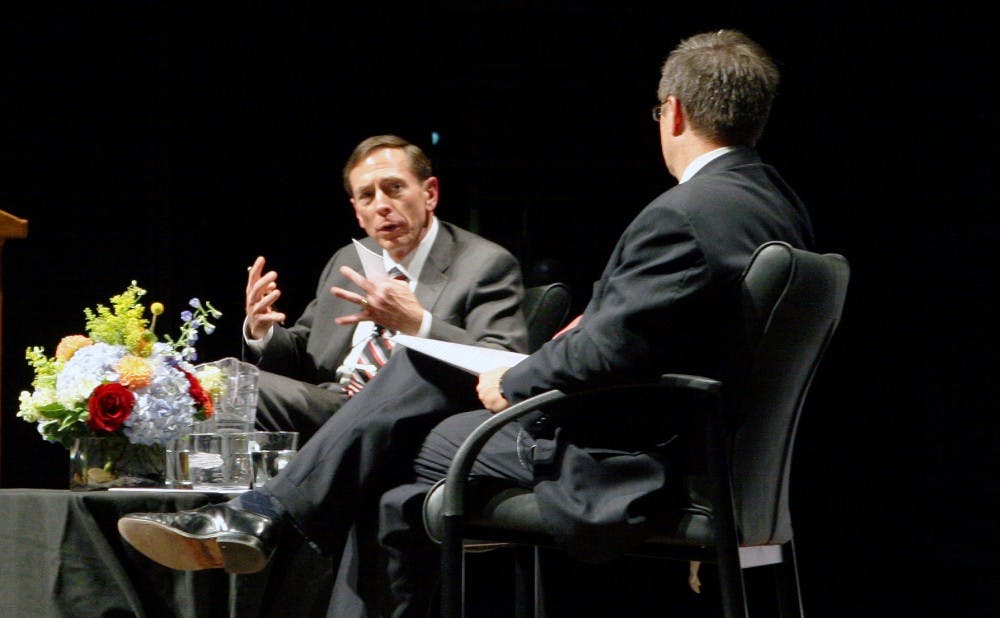Whether it’s military or diplomatic action, retired four-star Army Gen. David Petraeus believes that the United States should send a message to Syria.
In the midst of an ongoing debate about the situation in Syria, the former Central Intelligence Agency director spoke to a packed audience in Page Auditorium Wednesday evening—the 12th anniversary of the 9/11 attacks. Drawing on his experience as a military leader in the Iraq and Afghanistan wars, Petraeus said the United States should demonstrate to Syria and other potential aggressor nations that chemical weapons are unacceptable.
“It’s a challenging image,” he said of the magnitude of Syria’s chemical weapon stockpile.
Over the weekend, Petraeus endorsed the White House’s proposal for military action in Syria. President Barack Obama’s plan to carry out limited strikes would deter other countries, such as Iran and North Korea, from using chemical weapons, he said in a brief written statement.
Since his Saturday statement, Syria has agreed to turn over its chemical weapons for international control. Petraeus said the offer, orchestrated by the Russian government, could be a viable diplomatic solution.
He went as far as to say that the offer was a “lifeline” to the White House, which has been struggling with public and congressional opposition to Obama’s plan. If it succeeds, Russia would be a winner, he added.
Either option—military strike or Russia’s solution—would be challenging, though, he noted. Both require an outside force to take out approximately 1,000 tons of chemical weapons and precursor materials, which are located at more than 40 sites around a country ravaged by civil war.
“It’s an enormous task,” he said. “But if it can happen, great.”
Petraeus skirted around a question about whether or not America should have assisted rebel forces earlier on in the Syria conflict, posed by political science and public policy professor Peter Feaver, who lead the discussion and served as a special adviser for strategic planning and institutional reform on the National Security Council during the Iraq War.
“It’s a regional civil war in a single country,” Petraeus said, adding that there are numerous sides in the war, including several players that the United States would not like to see in power.
When he spoke about possible U.S. action in Syria, junior Safaa Al-Saeedi said Petraeus discussed the Middle East as a place that is unable to take care of itself—like a “backyard” that America has to maintain.
“I wasn’t pleased with that notion,” said Al-Saeedi, who is from Yemen, where she said Petraeus is a household name.
Petraeus dodged questions about current events like he was preparing to run for office, said sophomore Luke Maier, who sits on the American Grand Strategy program at Duke. Maier, who also attended a small-group discussion with Petraeus earlier on Wednesday, said he freely talked about past events in Iraq and Afghanistan, but eased around questions regarding leaks about National Security Agency phone-collecting tactics.
“War hero political ambitions are possible,” Maier said.
At the public talk, Petraeus said he “wouldn’t get into” the politics of leaker Edward Snowden and the NSA. He noted, though, that the leaks put U.S. intelligence gathering at risk by exposing crucial tactics.
“Snowden signed all the relevant [non-disclosure] documents,” he said. “He’s violated what he signed, and it’s why he’s not coming home.”
Petraeus also declined to talk about drone strikes, citing his position as a former CIA director.
On the subject of the terrorist attacks on the U.S. diplomatic mission in Benghazi exactly one year ago, Petraeus said America has yet to retaliate because of the difficulty of tracking down the perpetrators.
“The root of the problem is we don’t have a government to work with in Libya,” he said.
Much of the discussion centered around his role in the Iraq and Afghanistan wars. When Feaver asked about current violence and discord in Iraq, like his Libya response, Petraeus said some of the issues have to do with local government problems, rather than the fact that the United States pulled out.
“People would have loved to see a more substantial structure on the ground,” he said, regarding public opinion on post-war Iraq.
Army Reserve Capt. Austin Dufresne, of Raleigh, said he was thrilled to see Petraeus—who he served under while deployed in Iraq—face-to-face.
“Because of his role in the military, he was like a god on the battlefield,” Dufresne said. “To see him in person—it was very exciting.”
A graduate of the United States Military Academy at West Point, Petraeus served in the military for 37 years, including as the commander of coalition forces in Iraq and Afghanistan and the commander of U.S. Central Command. He was the CIA director for a little over a year until he stepped down November 2012, after it was revealed that he was having an extramarital affair with his biographer.
According to Politico, this was Petraeus’ first paid speech since leaving the CIA.
The Ambassador Dave and Kay Phillips Family International Lecture, titled “America and the World,” was sponsored by Duke American Grand Strategy, the Sanford School of Public Policy, the Triangle Institute for Security Studies, the Duke Office of Global Strategy and Programs and Duke's political science department.
Get The Chronicle straight to your inbox
Signup for our weekly newsletter. Cancel at any time.

